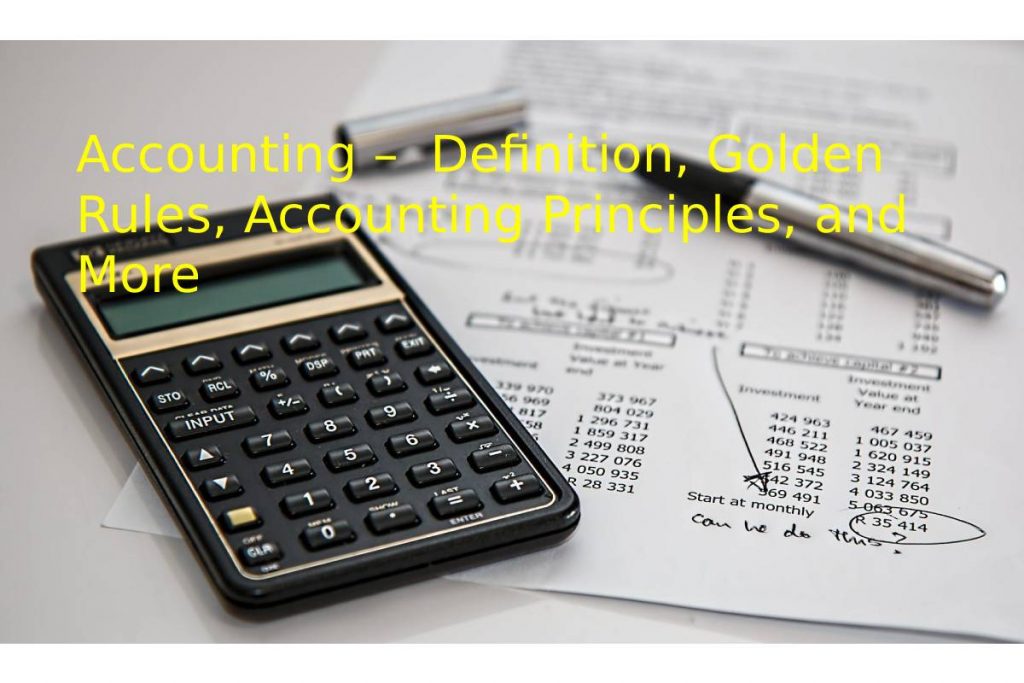Table of Contents
Definition
Accounting is of System of control and registration of expenses and income and other economic actions carry out by a company or entity.” I bought an office software calls “Part of the economy that studies these systems or the different items that reflect the financial activities of a company or entity.
The Three Golden Rules of Accounting – Real, Personal, and Nominal Accounts
The traditional Approach consists of rules popularly known as the Three Golden Rules of Accounting. These rules are applicable irrespective of all categories of the transaction. More ever, these three most talking about and basic Golden rules of accounting are to make debit and credit in the accounting ledger by categorizing each business or entry into either
- Real
- Personal or
- Nominal Accounts
- Now let us take each accounting rule in detail.
Real Account
- Real Accounts are a set of substantial parts of the business like furniture, cash, etc.
- If the item that belongs to the actual account is coming into the business, it should be written on the Debit side while making the accounting entries.
- If the item of real account is going out of the business, then while creating the accounting entries
- It should be written on the Credit side.
The accounting rule of the real account goes like
“Debit what comes in,
credit what goes out.”
Personal Accounts
- If the person/ group of persons/ legal body is receiving something from the business, then – Debit the receiver
- If the person/ group of persons/ legal body is saying something to the business – Credit the payer or giver
The bookkeeping rule of a personal account goes like
“Debit the receiver,
Credit the giver.”
Nominal Accounts
Nominal Accounts represent all the Expenses, losses, income, and advantages incurring while doing business. Some common, e.g., are
- Electricity Expenses,
- Telephone Expenses,
- Interest Receives,
Profit on Sale of Machines, etc.
If its an expense or loss for the business – Debit
If it is an income or gain for the industry – credit
Accounting Principles
Generally accepted accounting principles ( GAAP ) or financial reporting standards ( NIF ) are general rules that serve as an accounting guide to formulate criteria related to measuring equity and information on an entity’s equity and then economic elements. The GAAP constitutes limitations so that the preparation of the financial statements is based on uniform methods of accounting techniques.
One or more debit accounts always tally to one or added creditor accounts for the same amount. The sums of the “must” must be equal to those of the “credit.” Losses are debited, and gains are credited. The inheritance of the entity is different from that of its owners. The principle of the resources of a commodity is equal to the value of the shares that fall on it. The equity components and the causes of their results are represented by accounts in which notes are recorded or the variations to the concept they represent.
Importance
Accounting is a discipline based on a set of standardized procedures, which is responsible for quantifying, measuring, and analyzing. However, the economic operations of a person, company, or organization, and in turn, generating timely information that helps decision making that allows better use of resources, operating expenses are expected to be covered only with current income (that is, a zero operating result)
Therefore the Financial Balance will be in deficit by an amount exactly equal to that of the Net Investment. Financial information is records and reporting individually from the business owner’s personal information. However, a person can have a business and also a house and a car. However, the business’s financial records should not contain statistics about the belongings owns by the owner. Whenever, business financial records and personal financial records should not be mix. One bank account is uses for the owner’s use and another for the business. A business exists separately from its owner. The owners are creditors of the companies they have form. Even with several companies, each is treating as a separate entity. The owner is one more creditor of the entity, which is accounting for with the Capital account.
Concept of Accounting
To fulfill the main objectives of accounting, a set of techniques and methods are require that constitute an accounting method. The method comprises some essential elements of edge accounts as an effective way to group liabilities, assets, and current transactions. However, valuation is an effective way of expressing cash and its sources in monetary terms. Finally, the documentation is a details write and record of all the economic activity carry out, which gives legal force to the data records in the accounts.
Whenever, inventory is a periodic check of the assets recording in the organization’s balance sheet, which is carried out by weighing, describing, counting, reconciling, valuing the identify assets, and subsequently comparing the results with the accounting data. Whenever the balance sheet is one of the primary sources of information and a way of economically grouping the different assets of the organization base on the sources of formation, composition, and allocation, expressing in monetary equivalent and preparing as of a specific date or time.
Conclusion
Accounting is base on the need to have accurate, timely, and complete financial information, with documents and records that demonstrate the processes carry out by an entity and the results obtaining that reflect its financial situation.
